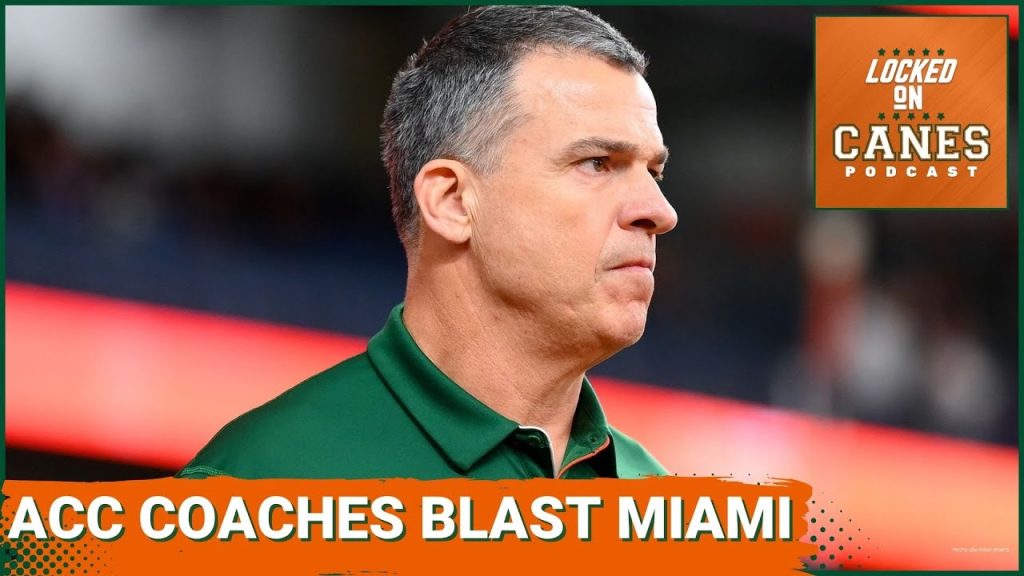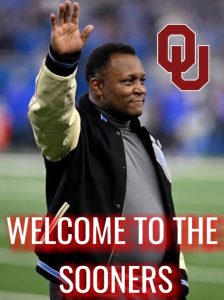
The Locked On Canes podcast recently sparked a heated conversation within the college football community when it spotlighted a growing trend among ACC coaches openly ridiculing the Miami Hurricanes. What once was a powerhouse program steeped in tradition and dominance now finds itself under the harsh glare of its conference rivals’ jabs and dismissive commentary. This evolving dynamic has reignited debates over Miami’s current status in the ACC and their future prospects.
For decades, Miami football was synonymous with excellence. The Hurricanes claimed five national championships and became a symbol of swagger and toughness that defined college football’s golden era. Their production line of NFL talent, iconic coaches, and championship pedigree placed them in the pantheon of college football royalty. But as the college football landscape shifted and the ACC evolved, Miami’s grip on greatness has noticeably loosened. The Locked On Canes podcast dove deep into how this transition is being viewed from the sidelines—specifically by ACC coaches themselves.
On the podcast, hosts discussed multiple instances where coaches from rival ACC programs appeared to openly belittle Miami, sometimes under the guise of humor, but often with a sharp edge of condescension. This ridicule reflects a perception that Miami is no longer a top contender, and some coaches seem to view the Hurricanes as a relic of the past rather than a current threat. The shift is telling: once revered opponents are now being openly mocked, a shift that reveals both the changing balance of power in the ACC and Miami’s struggles to reclaim its former glory.
The podcast analysis unpacked comments and behaviors from various ACC coaches during press conferences, media interviews, and off-the-record moments where Miami was the punchline. Coaches from programs like Clemson, Florida State, and North Carolina have all been cited as making sly remarks about Miami’s decline—highlighting Miami’s inconsistency, recent losses, and program instability. For example, some coaches have taken subtle digs at Miami’s inability to sustain success despite top recruiting classes, while others have mocked the Hurricanes’ coaching changes and perceived lack of discipline.
One of the podcast hosts noted that this ridicule is partly fueled by Miami’s inability to maintain dominance in an increasingly competitive ACC landscape. Clemson’s rise to prominence in the last decade, Florida State’s recent resurgence, and even emerging programs like NC State and Wake Forest have pushed Miami further down the hierarchy. Rival coaches, sensing Miami’s vulnerability, have not held back in exploiting this perceived weakness to motivate their own teams and fans. This ongoing narrative feeds into the rivalry dynamic, but it also underscores a harsh reality for Miami: the program is no longer the unchallenged king of the ACC.
Miami’s decline and the ridicule from rival coaches are also reflections of broader challenges the program has faced off the field. From NCAA sanctions to coaching turnover, the Hurricanes have experienced a tumultuous decade that has disrupted continuity and stability. The Locked On Canes podcast emphasized that this instability makes it difficult for Miami to rebuild the kind of sustained success it once enjoyed. Rival coaches point to this as evidence that Miami’s problems go beyond the X’s and O’s and touch on deeper structural issues.
Moreover, the podcast explored how this ridicule has impacted Miami’s players and recruiting efforts. When coaches from other ACC teams publicly dismiss Miami, it inevitably sends ripples throughout recruiting circles. Prospective athletes notice when their potential future opponents or peers speak disparagingly about their program. This can erode confidence in Miami’s ability to compete at the highest level and sway top recruits toward other schools. The hosts discussed how Miami’s coaching staff must work doubly hard to counteract these negative perceptions and convince recruits that the Hurricanes are a program on the rise, not one in decline.
Despite the harsh words from rival coaches, the Locked On Canes podcast also highlighted Miami’s resilience and potential for resurgence. The hosts argued that while the Hurricanes have struggled, the program still possesses key elements that can fuel a turnaround. Miami’s location in a talent-rich recruiting hotbed, its proud history, and a passionate fanbase all offer a foundation upon which the program can rebuild. The challenge lies in restoring trust, stability, and competitive consistency—areas that rival coaches have cynically suggested Miami has lost.
A significant part of the podcast discussion revolved around Miami’s current coaching staff and their ability to change the narrative. The hosts debated whether the current head coach can silence critics by delivering tangible on-field results and reviving Miami’s winning culture. Rival coaches’ ridicule, the podcast suggested, might be a motivating factor that Miami’s coaches and players can use to fuel their drive. Turning the tables on this negativity would require not just winning games, but reclaiming respect within the ACC coaching fraternity.
The podcast also touched on Miami’s recruiting battles with other ACC teams and how rival coaches’ comments might influence these competitions. Miami’s ability to secure elite talent against the backdrop of public skepticism is a test of the program’s recruiting acumen and appeal. Locked On Canes argued that Miami’s recruiters must navigate this challenge by emphasizing the program’s legacy and vision for the future, while also demonstrating progress on the field to assure recruits that the Hurricanes are serious contenders once again.
Another layer to the discussion involved the broader ACC context. The conference itself has been evolving, with programs like Clemson and Florida State investing heavily in facilities, coaching, and recruiting. Miami’s rivals have seized the opportunity to assert dominance within the conference, and their coaches’ ridicule is a reflection of this shifting power dynamic. The podcast suggested that Miami must not only improve internally but also adapt to the increasingly competitive landscape to regain its standing.
In the midst of these challenges, the Locked On Canes podcast offered a cautiously optimistic outlook. While the ACC coaches’ ridicule reflects current frustrations and setbacks, it also highlights the respect Miami once commanded. The fact that rival coaches focus so intently on Miami shows the program’s lasting significance in the ACC narrative. Miami’s future depends on whether it can harness that legacy and respond to the criticism with renewed focus and determination.
Ultimately, the Locked On Canes podcast painted a vivid picture of a program at a crossroads. The ridicule from ACC coaches is more than just petty banter—it signals a broader question about Miami’s identity, direction, and competitiveness in a league that no longer automatically grants them respect. For Hurricanes fans and stakeholders, the podcast underscores the urgency of rebuilding not only a winning team but also the pride and esteem that once defined Miami football.
The conversation sparked by the podcast serves as a reminder of the brutal realities of college football. No program, regardless of history, is immune to cycles of rise and fall. Miami’s story is still being written, and the ACC coaches’ ridicule, while painful, could be the fuel that propels the Hurricanes back to prominence. Whether that comeback happens remains to be seen, but one thing is clear: Miami cannot afford to ignore the voices from around the conference that challenge their legitimacy. The Locked On Canes podcast has brought those voices into sharp relief, challenging the program to rise or fall by its response.





